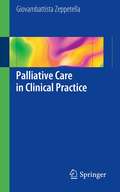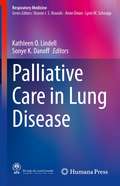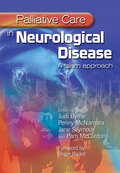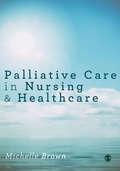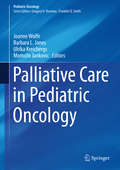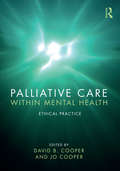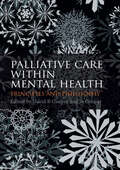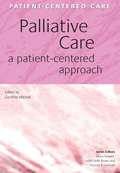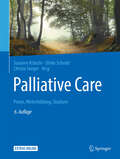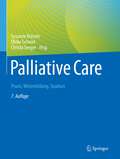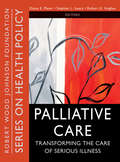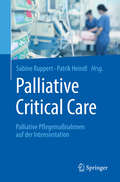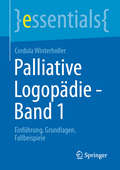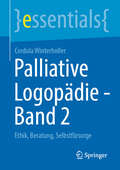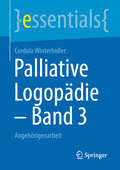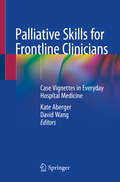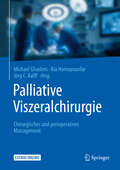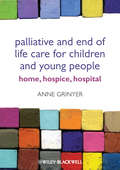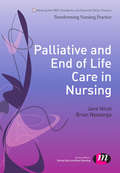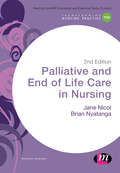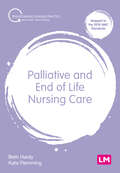- Table View
- List View
Palliative Care in Clinical Practice
by Giovambattista ZeppetellaWhen a person suffers from advanced, progressive illness, palliative care - treatments that improve the physical and psychological quality of life of patients and their families - can be just as important as treatments that aim to slow or prevent disease progression. Aimed at GPs and trainees, Palliative Care in Clinical Practice offers an accessible and practical introduction to palliative medicine, including a chapter devoted to each of the key areas of symptom management. Clearly and concisely written and fully illustrated throughout, it will be a useful resource for all healthcare professionals who wish to gain an understanding of this important aspect of medicine.
Palliative Care in Hematologic Malignancies and Serious Blood Disorders: A Clinical Guide
by Christina K. Ullrich Eric J. RoelandThis book provides a comprehensive, state-of-the-art overview on palliative care for patients with hematologic malignancies and other serious blood disorders. The text reviews the unique needs of this patient population, management strategies for hematologists/oncologists and palliative care clinician collaboration, and issues salient to the provision of palliative care, including communication, decision-making, advance care planning, symptom management, ethics, and nursing considerations. The book also spotlights special hematology populations, such as pediatric and older adult patients, and issues pertaining to the care of patients with blood disorders at the end of life.Divided into four sections, this book provides a comprehensive, state-of-the-art overview on palliative care for patients with hematologic malignancies and other serious blood disorders.Written by experts in the field, Palliative Care for Hematologic Malignancies and Serious Blood Disorders: A Clinical Guide is a valuable resource that will support and guide clinicians as they care for this patient population and address their particular needs.
Palliative Care in Lung Disease (Respiratory Medicine)
by Kathleen O. Lindell Sonye K. DanoffThis book details the benefits of palliative care to improve the lives of patients with serious lung disease and their caregivers. Palliative care is specialized medical care for people living with a serious illness. This type of care is focused on providing relief from the symptoms and stress of a serious illness, and is often described as “an extra layer of support” for patients and their caregivers, as patients with malignant and nonmalignant lung disease experience great symptom burden and have advanced care planning needs.This book has three main objectives:Define the role of palliative care in advanced lung diseaseIncorporate a patient-centered perspective in describing symptom burden and interventions to improve quality of lifeProvide current initiatives to expand evidence-based practice and improve access to palliative care Written by leading experts in palliative care and respiratory medicine, the chapters seek to answer those objectives by first defining and describing palliative care, advanced lung disease, and inadequate palliative care in this patient population. Patient reported outcomes, quality of life, and interventions to help deal with the psychological toll of serious illness are then detailed, as well as pharmacological and non-pharmacological interventions for symptom management. Detailed information is additionally provided on current research studies and management for several lung diseases, including COPD, ILD, Lung Cancer, Pulmonary Arterial Hypertension, Neuromuscular disease, and pediatric lung disease. The more administrative aspects of palliative care programs are then covered with an example of a specialty palliative care program for advanced lung disease and advice on how to address policy that promotes palliative care. Finally, palliative care's role during a pandemic is thoughtfully considered.This book is an ideal guide for clinicians, nurses, hospital administrators, teachers, students to help them understand and fill unmet care needs that many patients with serious lung disease experience.
Palliative Care in Neurological Disease: A Team Approach
by Jane Seymour Judi Byrne Penny McNamara Pam McClintonThe particular needs of people with progressive long-term neurological conditions - including Parkinson's Disease, Motor Neurone Disease (MND), Multiple Sclerosis (MS) and Huntington's disease - may make care delivery and planning the last stages of life ethically, practically and clinically challenging.
Palliative Care in Nursing and Healthcare
by Michelle BrownThis book helps nursing and healthcare students to prepare for the challenges of working with the increasing number of patients requiring palliative care, so that they can work in partnership with patients and their carers, providing care that is compassionate, practical and backed up by the latest evidence. Delivering palliative care can be emotionally challenging and the book focuses on supporting healthcare staff, allowing them to provide the care that is needed. Key features include: * case studies in every chapter, helping students to practically work through difficult scenarios * reflective activities that assist readers in thinking critically about their care and how to improve it * a holistic approach to palliative care that includes family, carers and interprofessional work * up to date theory and policy. Palliative Care in Nursing and Healthcare is suitable for undergraduate nursing students and allied health students and practitioners. Michelle Brown is Senior Lecturer at the University of Derby.
Palliative Care in Nursing and Healthcare
by Michelle BrownThis book helps nursing and healthcare students to prepare for the challenges of working with the increasing number of patients requiring palliative care, so that they can work in partnership with patients and their carers, providing care that is compassionate, practical and backed up by the latest evidence. Delivering palliative care can be emotionally challenging and the book focuses on supporting healthcare staff, allowing them to provide the care that is needed. Key features include: * case studies in every chapter, helping students to practically work through difficult scenarios * reflective activities that assist readers in thinking critically about their care and how to improve it * a holistic approach to palliative care that includes family, carers and interprofessional work * up to date theory and policy. Palliative Care in Nursing and Healthcare is suitable for undergraduate nursing students and allied health students and practitioners. Michelle Brown is Senior Lecturer at the University of Derby.
Palliative Care in Oncology
by Bernd Alt-Epping Friedemann NauckPalliative care provides comprehensive support for severely affected patients with any life-limiting or life-threatening diagnosis. To do this effectively, it requires a disease-specific approach as the patients' needs and clinical context will vary depending on the underlying diagnosis. Experts in the field of palliative care and oncology describe in detail the needs of patients with advanced cancer in comparison to those with non-cancer disease and also identify the requirements of patients with different cancer entities. Basic principles of symptom control are explained, with careful attention to therapy for pain associated with either the cancer or its treatment and to symptom-guided antineoplastic therapy. Complex therapeutic strategies for palliative cancer patients are highlighted that involve both cancer- and symptom-directed options and address a range of therapeutic aims. Issues relating to drug use in palliative cancer care are fully explored, and a separate section is devoted to care in the final phase. A range of organizational and policy issues are also discussed, and the book concludes by considering likely future developments in palliative care for cancer patients. Palliative Care in Oncology will be of particular interest to palliative care physicians who are interested in broadening the scope of their disease-specific knowledge, as well as to oncologists who wish to learn more about modern palliative care concepts relevant to their day-to-day work with cancer patients.
Palliative Care in Pediatric Oncology
by Joanne Wolfe Barbara L. Jones Ulrika Kreicbergs Momcilo JankovicThis textbook is the first to focus on comprehensive interdisciplinary care approaches aimed at enhancing the wellbeing of children with cancer and their families throughout the illness experience. Among the topics addressed are the epidemiology of pediatric cancer distress, including physical, emotional, social, and spiritual dimensions; the role of the interdisciplinary team; communication and advance care planning; symptom prevention and management; care at the end of life; family bereavement care; and approaches to ease clinician distress. The contributing authors are true experts and provide guidance based on the highest available level of evidence in the field. The book has not only an interdisciplinary but also an international perspective; it will appeal globally to all clinicians caring for children with cancer, including physicians, nurses, psychosocial clinicians, and chaplains, among others.
Palliative Care within Mental Health: Ethical Practice (Radcliffe Ser.)
by David B. Cooper Jo CooperPalliative Care Within Mental Health: Ethical Practice explores the comprehensive concerns and dilemmas that occur surrounding people experiencing mental health problems and disorders. Working beyond narrow, stereotypical definitions of palliative care as restricted to terminal cancer patients, this balanced and thought-provoking volume examines the many interrelated issues that face the individual, families, and caregivers, setting the groundwork for improved, ethical relationships and interventions. Chapters by experts and experienced practitioners detail the challenges, concerns, and best practices for ethical care and responses in a variety of individual and treatment contexts. This is an essential and thoughtful new resource for all those involved in the fast-developing field of palliative mental health.
Palliative Care within Mental Health: Principles and Philosophy
by David B. Cooper Jo CooperIs there a place for palliative care within mental health? This inspirational book offers an excellent foundation for integrating best-practice specialist palliative care into serious and enduring mental health service delivery. The shared practice values and vision between these two disciplines provide an optimistic starting point from which to address the lack of palliative care service delivery in mental health practice. Focusing on the similarity in philosophy between palliative care and mental health practice, it incorporates: . person-centred practice . relationship-based connectedness . a belief in compassionate care . respect for autonomy and choice . quality-of-life issues. The book addresses the practice skills needed in preparation for competent intervention and treatment. Each chapter develops a theoretical framework which is supported by practical application. Both professionals and students of palliative care will find the interactive text and practical case studies especially valuable, as will the professional working in substance use. Its userfriendly approach will appeal to a wide range of readers in various related disciplines. 'While it could be assumed that mental health has a lot to offer palliative care, we both [feel] that palliative care could offer more to mental health practice...It is a neglected area. There is little or no literature related to palliative care within serious mental health practice, and that which does exist relates to care of the dying in terms of cancer.' From the Preface.
Palliative Care: A Patient-Centered Approach
by Geoff MitchellAs the population in western cultures ages, more people suffer chronic, ultimately life-limiting diseases and medical professionals need to be equipped to cope with the ever growing pressure of palliative care. This book gives guidance on how to approach patients with life limiting illness. While the problems most people present to the doctor appear relatively straightforward, a whole person approach to understanding the complex interaction between the person, their illness and their environment should lead to a more complete consideration of the illness and better health outcomes. For issues of palliative care, such an approach is essential to identify and meet the many needs of desperately ill people. Palliative Care offers a fresh look at the management of patients. With international, evidence-based contributions, the book suggests practical and challenging ways to care for the dying. It is ideal for all healthcare professionals working in palliative care, General Practitioners and medicine and healthcare students.
Palliative Care: Praxis, Weiterbildung, Studium
by Susanne Kränzle Ulrike Schmid Christa Seeger Däubler-GmelinMenschen in ihrer letzten Lebensphase begleitenAlle beruflich Pflegenden und ehrenamtlich Begleitende finden in diesem Buch die notwendigen Kenntnisse für eine umfassende Betreuung von schwerstkranken und sterbenden Menschen und deren Angehörige zu: Prophylaxen, Therapien, Schmerzlinderung Kommunikation und Ethik Psychosoziale Betreuung Gesetzliche Grundlagen und Hinweise zur Finanzierung durch die Krankenkassen Besondere Situationen bei Kindern, Menschen im Wachkoma, mit geistigen Behinderungen und Demenz Neu in der 6. Auflage Psychosoziale Begleitung von Sterbenden und ihren AngehörigenPalliative Sedierung Besonderheiten im Sterben von Männern Palliative Care für Menschen am Rande der Gesellschaft Vom Wunsch zu Sterben und der Verantwortung der Betreuenden Sterbehilfe Existenzielle Verzweiflung Haltung im palliativen Kontext Akupressur, Hypnotherapie, Musiktherapie, Kunsttherapie Themenrelevante Gesetzestexte, zahlreiche Links und Adressen zu Patientenverfügung und Generalvollmacht sowie Musterschreiben für Betreuer und Ärzte finden Sie auf unserer Website.
Palliative Care: Praxis, Weiterbildung, Studium
by Susanne Kränzle Ulrike Schmid Christa SeegerMenschen in ihrer letzten Lebensphase begleitenAlle beruflich Pflegenden und ehrenamtlich Begleitenden von schwerstkranken und sterbenden Menschen und deren Zugehörigen finden in diesem Buch die notwendigen Kenntnisse zu Themen und Fragestellungen rund um Sterben, Tod und Trauer:Prophylaxen, Therapien, SchmerzlinderungKommunikation und EthikPsychosoziale BetreuungGesetzliche Grundlagen und Hinweise zur Finanzierung durch die KrankenkassenBesondere Situationen bei Kindern, Menschen im Wachkoma, mit geistigen Behinderungen und DemenzPsychosoziale Begleitung von Sterbenden und ihren AngehörigenPalliative SedierungBesonderheiten im Sterben von MännernPalliative Care für Menschen am Rande der GesellschaftVom Wunsch zu Sterben und der Verantwortung der BetreuendenSuizidassistenzExistenzielle VerzweiflungHaltung im palliativen KontextAkupressur, Hypnotherapie, Musiktherapie, Kunsttherapie, TrauerDie 7. Auflage ist komplett überarbeitet und aktualisiert.
Palliative Care: Transforming the Care of Serious Illness (Public Health/Robert Wood Johnson Foundation Anthology #33)
by Robert Hughes Diane E. Meier Stephen L. IsaacsPalliative Care is the first book to provide a comprehensive understanding of the new field that is transforming the way Americans deal with serious illness. Diane E. Meier, M.D., one of the field's leaders and a recipient of a MacArthur Foundation "genius award" in 2009, opens the volume with a sweeping overview of the field. In her essay, Dr. Meier examines the roots of palliative care, explores the key legal and ethical issues, discusses the development of palliative care, and presents ideas on policies that can improve access to palliative care. Dr. Meier's essay is followed by reprints of twenty-five of the most important articles in the field. They range from classic pieces by some of the field's pioneers, such as Eric Cassel, Balfour Mount, and Elizabeth Kübler-Ross, to influential newer articles on topics such as caregiving and cost savings of palliative care. The reprints cover a wide range of topics including: Why the care of the seriously ill is so important Efforts to cope with advanced illness Legal and ethical issues Pain management Cross-cultural issues Philosophical perspective The demand for palliative care has been nothing short of stunning—largely because of palliative care's positive impact on both the quality and the cost of care provided to seriously ill individuals. By providing a wide-ranging perspective on this growing field, this book will serve as a guide for developing meaningful approaches that will lead to better health care for all Americans.
Palliative Critical Care: Palliative Pflegemaßnahmen auf der Intensivstation
by Sabine Ruppert Patrik HeindlEtwa 5 bis 30 Prozent der Patienten auf der Intensivstation versterben unter palliativen Maßnahmen. Das zeigt die Notwendigkeit der Integration von Palliative Care im intensivmedizinischen Bereich auf. Das Buch führt erstmalig die Gemeinsamkeiten der Intensiv- und Palliativpflege praxisorientiert zusammen und etabliert das neue Verständnis von Palliative Critical Care (PCC). Allgemeine Kapitel beschäftigen sich mit dem Sterben an sich und dem heutigen Stand von Critical Care und Palliative Care. Des Weiteren werden wichtigen Themen zur ethischen Entscheidungsfindung und die Kongruenz bzw. Divergenz von Critical Care und Palliative Care diskutiert. Konkrete pflegerische Handlungen zur Linderung von häufigen Symptomen werden ebenso vorgestellt wie der psychosoziale Umgang mit Angehörigen sowie Sterbebegleitung unter den eingeschränkten Rahmenbedingungen auf der Intensivstation. Das Buch richtet sich in erster Linie an Pflegefachkräfte aus dem Intensiv- und Palliativbereich und möchte für diese Zielgruppen einen wichtigen Beitrag zur Sensibilisierung für Problemlagen von Patienten am Lebensende auf Intensivstationen leisten.
Palliative Logopädie - Band 1: Einführung, Grundlagen, Fallbeispiele (essentials)
by Cordula WinterhollerDie Logopädie als therapeutischer Baustein findet nur langsam ihren Platz im interdisziplinären Team des Palliative Care Settings. Dabei gehört zu den Aufgaben von Logopäd*innen und Sprachtherapeut*innen auch die Versorgung von schwerstkranken und sterbenden Menschen auf der Palliativstation, im Hospiz oder zu Hause. Bei neuro-palliativen Patienten stehen dabei die Behandlung von Schluck-, Sprach-, Sprech- und Stimmstörungen im Fokus. In diesem Essential erfahren Sie, welche Zielsetzungen, Maßnahmen und Methoden die palliative Logopädie als neuer Fachbereich innerhalb der Logopädie einnehmen kann. Dieser Band 1 beschreibt die Entstehungsgeschichte, Möglichkeiten der Qualitätssicherung und Assessments im therapeutischen Alltag. Fallbeispiele geben wertvolle Tipps für die Mundpflege und zum Thema Spiritualität. Anamnese-, Beobachtungsbögen und ein Essensprotokoll unterstützen die Verlaufskontrolle bei Schluckstörungen. Band 2 beinhaltet die Themen Ethik, Beratung und Selbstfürsorge, Band 3 das Thema Angehörigenarbeit.
Palliative Logopädie - Band 2: Ethik, Beratung, Selbstfürsorge (essentials)
by Cordula WinterhollerDie Logopädie als therapeutischer Baustein findet nur langsam ihren Platz im interdisziplinären Team des Palliative Care Settings. Dabei gehört zu den Aufgaben von Logopäd*innen und Sprachtherapeut*innen auch die Versorgung von schwerstkranken und sterbenden Menschen auf der Palliativstation, im Hospiz oder zu Hause. Bei neuro-palliativen Patienten stehen dabei die Behandlung von Schluck-, Sprach-, Sprech- und Stimmstörungen im Fokus. Die Förderung von Ressourcen in der Kommunikation, beim Essen und Trinken und der Atmung sind für Betroffene von großer Bedeutung. Umso wichtiger ist es, Betroffene und Angehörige fundiert zu beraten und zu begleiten. Ethische Überlegungen fordern Therapeut*innen dabei heraus.In Band 1 erfahren Sie, welche Zielsetzungen, Maßnahmen und Methoden der Bereich der palliativen Logopädie als neuer Fachbereich innerhalb der Logopädie einnehmen kann. Dieser Band 2 legt den Schwerpunkt auf Ethik, Beratung und Selbstfürsorge, Band 3 auf eine praxisnahe Angehörigenberatung.
Palliative Logopädie – Band 3: Angehörigenarbeit (essentials)
by Cordula WinterhollerDie Logopädie als therapeutischer Baustein findet nur langsam ihren Platz im interdisziplinären Team des Palliative Care Settings. Dabei gehört zu den Aufgaben von Logopäd*innen und Sprachtherapeut*innen auch die Versorgung von schwerstkranken und sterbenden Menschen auf der Palliativstation, im Hospiz oder zu Hause. Bei neuro-palliativen Patienten stehen dabei die Behandlung von Schluck-, Sprach-, Sprech- und Stimmstörungen im Fokus. Dieser Band 3 der dreibändigen Reihe geht auf das Umfeld von Angehörigen und deren gezielten und professionellen Unterstützung ein. Sie lernen Instrumente für das Erkennen von Belastungsfaktoren kennen, wie Umfeldanalyse, Belastungswaage und SUD-Skala und können so gezielt auf eine Entlastung reagieren. In Band 1 erfahren Sie, welche Zielsetzungen, Maßnahmen und Methoden der Bereich der palliativen Logopädie als neuer Fachbereich innerhalb der Logopädie einnehmen kann. Band 2 legt den Schwerpunkt auf Ethik, Beratung und Selbstfürsorge.
Palliative Skills for Frontline Clinicians: Case Vignettes in Everyday Hospital Medicine
by David Wang Kate AbergerRooted in everyday hospital medicine, Palliative Skills for Frontline Clinicians addresses the challenges of delivering complex care to patients living with serious illnesses. Spanning emergency medicine, internal medicine, surgery and various subspecialties, each chapter reads like a story, comparing usual care with a step-by-step palliative-based approach. This case-based book features a multidisciplinary, palliative-trained authorship, including neurologists, nephrologists, emergency physicians, surgeons, intensivists, and obstetricians. Divided into four parts, Palliative Skills for Frontline Clinicians outlines common clinical scenarios across settings and specialties to highlight unmet needs of patients with potentially terminal illnesses. Each case is broken down into the usual standard approach, and delves into detail regarding different palliative interventions that can be appropriate in those scenarios. These are meant to be practice changing; down to the actual words used to communicate with patients. In addition to the book’s focus on the principles of palliative care and the “art” of treating the patient, approaches to communication with the patient’s families for the best long-term outcomes are discussed. Concise and pragmatic, Palliative Skills for Frontline Clinicians is meant to be practice changing. It provides readers with both a new conceptual framework, as well as actual words to communicate with patients and medication doses for symptom management. It is an invaluable resource for non-palliative trained clinicians who wish to strengthen their palliative care skills.
Palliative Treatment for Advanced Cancer Patients: Can Hope Be a Right?
by Cynthia Pereira AraújoThis book presents an important reflection on the concept and limits of the Fundamental Right to Health as opposed to a supposed “Right to Hope” in the context of the treatment of patients with advanced cancer. The central idea of the work is the question of whether and to what extent patients with advanced cancer have the right to legally demand a palliative treatment whose efficacy has not been proven from the point of view of the desired objectives. The book demonstrates how hope cannot be subject to legal protection and, also, that, even if theoretical-legal reasons were not sufficient for the absence of an abstract right to hope, ethical reasons would be. The work concludes that the best palliative care, rather than palliative treatment, guarantees the best right to health for advanced cancer patients, especially in terminal cases.In addition to this theoretical discussion, the book also presents the results of a qualitative research the author conducted with 48 advanced cancer patients in Brazil and Germany to investigate their expectations towards chemotherapy. This study has confirmed that many patients decide to undergo often toxic and exhausting treatments, unrealistically believing that their cancer is curable or that, as long as they continue with a course of chemotherapy, cancer may be beaten. Palliative Treatment for Advanced Cancer Patients: Can Hope Be a Right? will be of interest to health professionals and social workers working with advanced cancer patients, as well as to researchers in the fields of public health, bioethics, medical ethics and health law, especially those interested in the growing interdisciplinary field of end-of-life decision-making.
Palliative Viszeralchirurgie: Chirurgisches und perioperatives Management
by Michael Ghadimi Kia Homayounfar Jörg C. KalffEin chirurgisches Vorgehen kann bei Patienten mit inkurablen Tumorerkrankungen aus sehr unterschiedlichen Gründen sinnvoll oder notwendig sein. In dieser besonderen Behandlungssituation sind zahlreiche Aspekte bei der Entscheidung für einen operativen Eingriff und bei der Wahl des geeigneten Eingriffs zu berücksichtigen. Neben dem Allgemeinzustand und der Lebensperspektive ist der Patientenwille ein entscheidender Faktor. Palliative Viszeralchirurgie geht über die Indikationsstellung und Durchführung der operativen Therapie hinaus und ist immer multiprofessionell; entsprechend sind die perioperativen Aspekte in eigenen Kapiteln gezielt beschrieben. Für die häufigsten klinischen Leitsymptome, die als Komplikationen der Erkrankungen auftreten können sind die interventionellen und chirurgischen Behandlungsoptionen fundiert und praxisorientiert dargestellt. Experten analysieren für die wichtigsten Tumorerkrankungen die bestehenden Behandlungsmöglichkeiten und –ergebnisse und leiten daraus Empfehlungen zum therapeutischen Vorgehen ab.
Palliative and End of Life Care for Children and Young People
by Anne Grinyer"Anne's contribution to our understanding of the needs of young people with cancer has been unparalleled and without her extraordinary insights our services would be that much poorer." From the foreword by Simon Davies , CEO Teenage Cancer TrustThis topical and timely text provides valuable insights into the choices and experiences of palliative and end of life care for young people with cancer and other life limiting illnesses. With a focus on palliative care provision across a range of different clinical settings, this comprehensive new resource explores care in the home, the hospice and hospital. It looks at how and where families and young people can access palliative care, and what support is offered to attain their preferred place of death. Bereavement support for families is discussed, as well as a discussion of multidisciplinary work, interagency co-operation and resource issues.This title is essential reading for community children's nurses, specialist palliative care teams, children's hospices, school nurses, social workers and student nurses as well as families.A comprehensive resource on end of palliative are provision for children and young adults with cancer and other life limiting illnessesTimely and topical, tying in with the Department of Health palliative care strategy 'Better Care: Better Lives'Written in an accessible style that does not assume either detailed medical or theoretical knowledgeExplores palliative care provision in a range of different clinical settings including the home, hospice, and hospitalProvides valuable insights into the experiences of parents, children and young people
Palliative and End of Life Care in Nursing
by Mrs Jane Nicol Brian NyatangaWith the number of people requiring palliative and end-of-life care set to increase by 2020, it is the responsibility of every nurse, regardless of specialism, to know how to provide high-quality care to this group of people. Yet caring for those nearing the end of life can throw up complex issues, including handling bereavement, cultural and ethical issues, delivering care in a wide variety of settings, symptom management and also ensuring your own emotional resilience. This book is specifically designed to equip nursing students and non-specialists with the essential knowledge in relation to the care and management of people nearing the end of life.
Palliative and End of Life Care in Nursing (Transforming Nursing Practice Series)
by Jane Nicol Brian NyatangaWith the number of people requiring palliative and end of life care steadily increasing, it is the responsibility of every nurse, regardless of specialism, to know how to provide high quality care to this group of people. Yet caring for those nearing the end of life can throw up complex issues, including handling bereavement, cultural and ethical issues, delivering care in a wide variety of settings, symptom management and also ensuring your own emotional resilience. This book is specifically designed to equip nursing students and non-specialists with the essential knowledge in relation to the care and management of people nearing the end of life.
Palliative and End of Life Nursing Care (Transforming Nursing Practice Series)
by Beth Hardy Kate FlemmingPalliative and end of life care are an essential component of nursing practice. This book provides students with the key information they need to deliver effective and safe end of life care for patients and their families. Crucially, it also creates opportunities for them to reflect on their own perspectives on death and dying and explore the impact of this on their practice. Key features Fully mapped to the NMC standards of proficiency for registered nurses (2018) Helps you to develop a holistic understanding of the fundamental principles and practice of palliative and end of life care Activities encourage you reflect on your own perspectives of death and dying and to consider the impact this has on your practice Case studies bring the theory to life and illustrate the real world applicability
